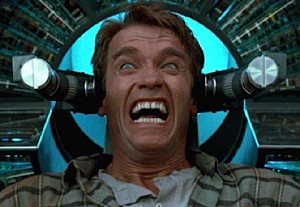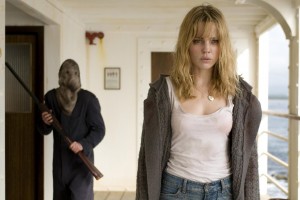They mess with your head, they riff on reality and illusion, they can be somewhat frustrating at times — and yet I love them. With the release of Christopher Nolan’s Inception this week, I thought it would be fun to take a look at some of my favorite cinematic head-scratchers.
 2001: A Space Odyssey (1968). “My God, it’s full of stars.” The lovable old grandpa of movie mind fucks is director Stanley Kubrick and writer Arthur C. Clarke’s seminal sci-fi masterpiece about evolution, strange monoliths and “stargates” that lead to white rooms where you can see various stages of human life unfold in a matter of minutes. I’ve seen the film many times and still don’t completely understand it all, so if you’re looking for answers I don’t have them. But like a lot of films on this list, it’s not so much about understanding everything as it is enjoying the trip.
2001: A Space Odyssey (1968). “My God, it’s full of stars.” The lovable old grandpa of movie mind fucks is director Stanley Kubrick and writer Arthur C. Clarke’s seminal sci-fi masterpiece about evolution, strange monoliths and “stargates” that lead to white rooms where you can see various stages of human life unfold in a matter of minutes. I’ve seen the film many times and still don’t completely understand it all, so if you’re looking for answers I don’t have them. But like a lot of films on this list, it’s not so much about understanding everything as it is enjoying the trip.
12 Monkeys (1995). “Oh, wouldn’t it be great if I was crazy? Then the world would be okay.” Time travel is always a good way to mess with people’s heads, especially ones in which the same person ends up in the same location twice but at the same time. Terry Gilliam directs a script by David and Janet Peoples (inspired by the 1962 French short La JetÁ©e by Chris Marker), set in a future where most of the population has been wiped out by a virus and a convicted criminal (Bruce Willis) is sent back in time to gather information about the outbreak.
eXistenZ (1999). “What if we’re not in the game anymore?” Writer-director David Cronenberg spins a yarn about a virtual reality game in which devices called “bio-ports” are inserted into the spines of the players, in a story reminiscent of the stories of Philip K. Dick (a writer whose adaptations show up on this list a couple of times). Naturally the effect is so realistic players can’t distinguish between the game and reality — and neither can we, the audience.
The Game (1997). “The game is tailored specifically to each participant. Think of it as a great vacation, except you don’t go to it, it comes to you.” Another tale in which the lines of reality, trickery and conspiracy are blurred, as Nicholas (Michael Douglas) participates in some kind of complex endeavor called the Game which effects his life in strange and frightening ways. Some of you might be wondering why David Fincher’s even better film Fight Club (1999) isn’t on this list and it’s because I think of it more as a film with a mind-bending plot twist rather than a mind-bender from beginning to end. Plus I’m not supposed to talk about Fight Club, it’s like a rule or something.
 Jacob’s Ladder (1990). “If you’re frightened of dying, and you’re holding on, you’ll see devils tearing your life away. If you’ve made your peace, then the devils are really angels, freeing you from the Earth.” Vietnam vet Jacob’s (Tim Robbins) life seems to be alternating between one reality in which he’s living with a co-worker (Elizabeth PeÁ±a) and is mourning the death of his son, and another reality in which he’s living with his wife (Patricia Kalember) and his son Gabe (Macaulay Culkin) is still alive — and all of this plus other bizarre “hallucinations” might be caused by a strange drug he was exposed to in combat. Exceptionally directed by Adrian Lyne, the nightmarish screenplay is written by Bruce Joel Rubin (the Oscar-winning screenwriter of 1990’s Ghost).
Jacob’s Ladder (1990). “If you’re frightened of dying, and you’re holding on, you’ll see devils tearing your life away. If you’ve made your peace, then the devils are really angels, freeing you from the Earth.” Vietnam vet Jacob’s (Tim Robbins) life seems to be alternating between one reality in which he’s living with a co-worker (Elizabeth PeÁ±a) and is mourning the death of his son, and another reality in which he’s living with his wife (Patricia Kalember) and his son Gabe (Macaulay Culkin) is still alive — and all of this plus other bizarre “hallucinations” might be caused by a strange drug he was exposed to in combat. Exceptionally directed by Adrian Lyne, the nightmarish screenplay is written by Bruce Joel Rubin (the Oscar-winning screenwriter of 1990’s Ghost).
The Matrix (1999). “Have you ever had a dream, Neo, that you were so sure was real? What if you were unable to wake from that dream? How would you know the difference between the dream world and the real world?” For the follow-up to their debut film Bound (1996), Larry and Andy Wachowski delivered The Matrix and took us all down one trippy-ass rabbit-hole, accompanied by some groundbreaking visual effects as well. Turns out the world as we know it isn’t real, but a simulation created by sentient machines who have enslaved us — or something like that. To quote Neo (Keanu Reeves), “Whoa …”
[kml_flashembed movie="http://www.youtube.com/v/UM5yepZ21pI" width="600" height="344" allowfullscreen="true" fvars="fs=1" /]
Memento (2000). “Memory can change the shape of a room, it can change the color of a car — and memories can be distorted.” Director Christopher Nolan burst onto the scene with this absorbing tale of Leonard (Guy Pearce), a man with short-term memory loss trying to solve his wife’s murder. Only here’s the thing, the entire freaking story is told backwards — the last scene is the first scene and the first scene is the last scene. So as each scene begins, we don’t know what happened before, immersing us head-on into Leonard’s world.
Minority Report (2002). “I’ve never heard of him. But I’m supposed to kill him in less than 36 hours.” It seems like a flawless system. In the near-future, three psychics known as “precogs” can see murders occurring in the future and with this information the Precrime division headed by John Anderton (Tom Cruise) can arrest the perps before the murder even happens. But things go awry when Anderton himself is envisioned murdering a man he’s never heard of in 3 days. Directed by Steven Spielberg, from a story by Philip K. Dick.
[kml_flashembed movie="http://www.youtube.com/v/m2OUv66-Js4" width="600" height="344" allowfullscreen="true" fvars="fs=1" /]
The Prestige (2006). “I add only one suggestion on using the machine: destroy it. Drop it to the bottom of the deepest ocean. Such a thing will bring you only misery.” Another mind fuck from Christopher Nolan, The Prestige tells a complicated tale of rival magicians in turn of the century London with a little Nikola Tesla science-fiction thrown in for good measure. The screenplay by Jonathan and Christopher Nolan (from a novel by Christopher Priest) is told in a totally nonlinear manner — with flashbacks occurring within flashbacks — involving a teleportation device that doesn’t quite work the way it was intended.
 Total Recall (1990). “Okay then, if I’m not me, who the hell am I?” Another mind-bender based on a Philip K. Dick story (We Can Remember It for You Wholesale), kicked up to maximum intensity by RoboCop director Paul Verhoeven. Construction worker Douglas Quaid (Arnold Schwarzenegger) partakes in a vacation memory implant — the only problem is distinguishing it from reality. By the end, we’re not even sure what’s real or not, but along the way enough clues are dropped (like the fact that his implant is titled “Blue Skies on Mars”) for the viewer to draw their own conclusion. Interestingly, David Cronenberg at one point was supposed to direct, but ultimately left the project over creative differences.
Total Recall (1990). “Okay then, if I’m not me, who the hell am I?” Another mind-bender based on a Philip K. Dick story (We Can Remember It for You Wholesale), kicked up to maximum intensity by RoboCop director Paul Verhoeven. Construction worker Douglas Quaid (Arnold Schwarzenegger) partakes in a vacation memory implant — the only problem is distinguishing it from reality. By the end, we’re not even sure what’s real or not, but along the way enough clues are dropped (like the fact that his implant is titled “Blue Skies on Mars”) for the viewer to draw their own conclusion. Interestingly, David Cronenberg at one point was supposed to direct, but ultimately left the project over creative differences.
 Triangle (2009). “It’s the only way to get home … you have to kill them … kill them!” A sailing trip near the Bermuda Triangle takes a turn for the worse when the sailboat become capsized in a bizarre storm, then the crew takes refuge in what appears to be a luxury cruise ship, only no one seems to be on board. That’s just the beginning — and since this is a film I suspect many of you haven’t seen yet, I wouldn’t dare spoil it for you. A little-known Australian thriller from writer-director Christopher Smith.
Triangle (2009). “It’s the only way to get home … you have to kill them … kill them!” A sailing trip near the Bermuda Triangle takes a turn for the worse when the sailboat become capsized in a bizarre storm, then the crew takes refuge in what appears to be a luxury cruise ship, only no one seems to be on board. That’s just the beginning — and since this is a film I suspect many of you haven’t seen yet, I wouldn’t dare spoil it for you. A little-known Australian thriller from writer-director Christopher Smith.





Comments